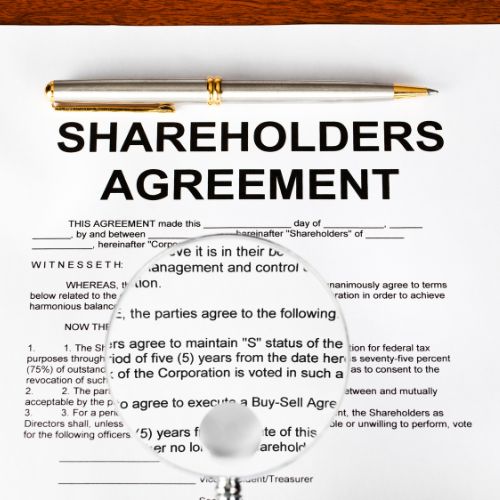What is a shareholders’ agreement?
A shareholders’ agreement is a contract between shareholders that regulates the relationship between them and forms the basis under which the company should be run. A shareholders’ agreement differs from the Articles of Association of a company in that it is a private document, and it does not have to be lodged at Companies house. Although there is no legal requirement to have such an agreement in place, it is an extremely useful tool in addressing all issues that can arise within a business.
Top 10 reasons to enter into a shareholders’ agreement:
- It can link shareholding to employment status
Shares may be held by employees and, often, shareholders of a company are also directors. A shareholders’ agreement can link shareholding to employment. It can set out good leaver and bad leaver provisions, which describe the circumstances in which a person ceases to be an employee. If an employee leaves or is dismissed for whatever reason, the other shareholders will probably want to buy the shares back from the exiting shareholder, otherwise they may still be entitled to dividends after they leave.
Whether an employee is a good leaver or a bad leaver, will have a direct implication on the value of their shares.
2. It sets out what happens on the death of a shareholder
The shareholders’ agreement can set out what happens to a shareholder’s shares on their death. For example, the company may be content for the shares to pass in accordance with the deceased’s will, but there may be other circumstances where the company will want the option to buy the shares back rather than letting them pass on to someone else. Setting out this procedure can provide answers to difficult questions and give comfort to shareholders.
3. Dispute resolution procedure
Although you may start your business with the best of intentions, and indeed you may even start the business with close family members or friends, it is not uncommon for these relationships to break down. Such disputes can lead to costly and time-consuming litigation. Setting out a dispute resolution mechanism can help to mitigate the impact of any animosity between shareholders. It can help shareholders to communicate and resolve issues, or, if such issues cannot be resolved, it can set out what is to happen next (e.g., a buy out or winding up of the company).
4. Customised dividends policy
The shareholders’ agreement can set out different levels of dividends payable between the parties. This could be to reflect different classes of shares, shareholding, or investments in the business.
5. Transfer of Shares
This clause within the agreement can give existing shareholders pre-emption rights over shares. This means that if a shareholder wishes to sell their shares, the shares firstly must be offered to existing shareholders.
6. Majority shareholder protection
A majority shareholder may wish to sell their shares, but quite often, buyers will want to buy the entire share capital of the company. The inclusion of drag along rights within the shareholders’ agreement can force minority shareholders to sell their shareholding too so as not to frustrate the sale process.
7. Minority shareholder protection
The shareholders’ agreement can outline a list of reserved matters that cannot be acted upon without the consent of all, or a specified majority of the shareholders. This will help to ensure that minority shareholders are involved with key decisions making processes that they may not otherwise have been privy to due to their smaller shareholding.
8. Restrictive Covenants
Existing shareholders may wish to prevent an exiting shareholder from setting up a business in competition with their company. It can be useful to include clauses within the shareholders’ agreement that will prevent an exiting shareholder from poaching clients, customers and employees from the business.
9. Confidentiality
Intellectual property and confidential information may need protected from unauthorised use. The shareholders’ agreement can include a confidentiality provision to prevent such information from being misused.
10. Set limits of control
The shareholders’ agreement can set out that key decisions will require the directors to obtain shareholder consent. This can limit the power of directors and provide the shareholders with greater control over the operations of the business.
If you would like to put a shareholders’ agreement in place to protect your business, please do not hesitate to contact us by email at [email protected] or by telephone on 028 9043 4015.

